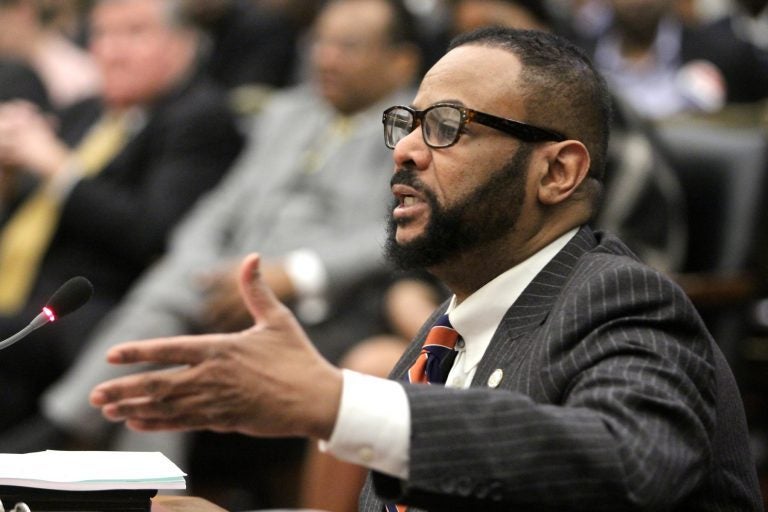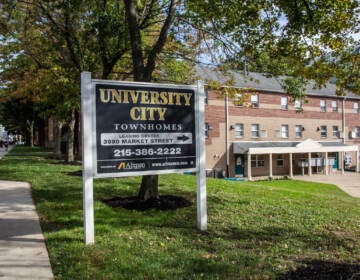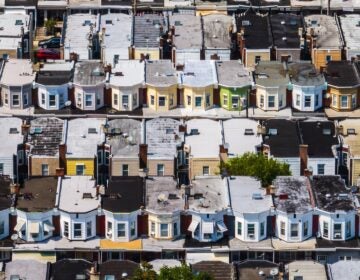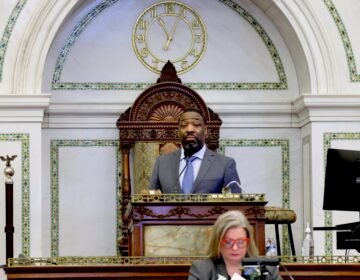Philly Council passes bill to create new emergency repair program for neglected buildings
The bill lays the groundwork for a city program that would enlist municipal workers to fix privately owned buildings at risk of damaging their surroundings.

Philadelphia Councilman Curtis Jones (Emma Lee/WHYY)
A bill unanimously passed by Philadelphia City Council on Thursday lays the groundwork for a citywide repairs program that would enlist municipal workers and subcontractors to resolve outstanding code violations tied to privately owned properties, including violations related to leaky roofs and damaged sewer lines.
The measure, approved with a 16-0 vote, is designed to hold accountable negligent property owners who have failed to make these necessary repairs despite city citations and, in some cases, being ordered by a judge to fix their property.
Patterned after programs in other big cities like New York and Los Angeles, the bill is meant to help residents whose homes are being damaged by a nuisance property. It would apply to single-family homes that have been vacant for a year or more and multi-story apartment buildings.
“We want to strategically look at these kinds of conditions and then remediate them early so that they don’t cause a larger problem, such as collapsing buildings, later on,” said Councilmember Curtis Jones Jr. in an interview.
Under the measure, property owners identified through the program — by either a resident, civic group or the Department of Licenses and Inspections — would have roughly a month to make the repairs after being notified by the city. After that, the department would step in, make the repairs and bill the property owner for the work.
Property owners would then have 30 days to reimburse the city. If they don’t, the city would automatically place a lien on the property.
It’s unclear what would happen if a property owner can’t afford to make the repairs themselves, a fact that concerns some housing equity advocates.
The bill passed despite considerable reservations from the Kenney administration around implementation, making it unclear if the mayor will ultimately sign the measure into law.
During a Council hearing held in early June, Sarah Adamo, legislative affairs manager for L&I, told lawmakers that, in many cases, it would be difficult, sometimes impossible, to gain access to properties to perform necessary inspections or repairs to resolve code violations.
The department typically needs permission from the property owner to gain access to a house. Without that permission, said Adamo, L&I would need to obtain a court order.
She also told a Council committee that her department is “not able to take on the administrative responsibilities” of managing the program.
“Additionally, the cost of these repairs, especially on larger structures, are significant. The Administration is apprehensive about our ability to recover funds from the property owner after the repairs have been completed. Without adequate funding, the desired goals of the legislation will not be achieved,” said Adamo.
In a statement sent prior to the bill’s passage, mayoral spokesperson Kevin Lessard reiterated Adamo’s concerns, saying there are “substantial barriers to administrating” the program outlined in Jones’ bill.
“As always, we’ll review the legislation if it passes. The Administration is always pleased to work together with Councilmembers on their legislative priorities,” he added.
Asked about the administration’s response, Jones said he’s not worried about the program dying on Kenney’s desk. “I have found, within this administration, they may reluctantly move forward, but they do move forward,” he said.
Jones said he is open to launching the program as a pilot, potentially in his West Philadelphia district, before expanding it citywide.

Subscribe to PlanPhilly
WHYY is your source for fact-based, in-depth journalism and information. As a nonprofit organization, we rely on financial support from readers like you. Please give today.









